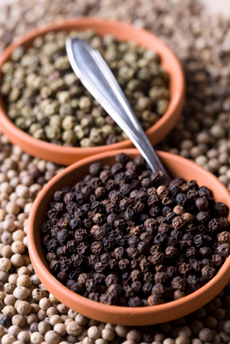TIP OF THE DAY: Use Only Freshly Ground Pepper
|
Pepper has been the world’s most popular spice for some 3,000 years. It has been treasured for its ability to add a kick to bland foods and, in pre-refrigeration days, to salvage food that turned rancid. (Salt, even more popular and essential than pepper, is not a spice. See the * footnote below).
Until the invention of the pepper mill† in 1842, peppercorns were freshly ground with a mortar and pestle. Pepper begins to lose flavor as soon as it’s ground. Pepper gets its spicy heat from piperine, a chemical compound that’s found in both the outer fruit and in the seed (the peppercorn). Once the pepper is ground, the piperine is exposed to the air and begins to evaporate. That’s why commercially ground pepper is a bland product. And that’s why today’s tip is: Always use whole peppercorns, and grind the pepper as you need it. If you don’t have a pepper mill, get one. Here’s a good, basic pepper mill that’s battery operated, so you don’t have to twist it to grind the pepper. |
 Use only whole peppercorns, ground as you need the pepper. Photo by Adam Kozlowski | IST. |
|
|
*Spices are aromatic seasonings obtained from the bark, buds, fruit, roots, seeds or stems of a plant or tree. Herbs are the leafy parts of the plant. Some plants yield both a spice and an herb. For example, the coriander plant provides coriander seeds, a spice, as well as cilantro leaves, an herb. Why aren’t cilantro leaves called “coriander leaves?” Cilantro is the Spanish word for coriander, and we adopted the Spanish word for the herb. †The pepper mill was invented by the Peugeot company in 1842. A family venture begun in a small village in eastern France around 1793, the company manufactured tools, coffee grinders and even bicycles. (A member of the family broke off to manufacture automobiles.) Why Not To Buy Peppercorns In Bulk Given the higher cost of whole peppercorns, why should you avoid buying them in bulk? As pre-ground pepper quickly loses its piperine kick to evaporation, the piperine in whole peppercorns also evaporates over time. Plus, most pepper is grown as a commodity, to be sold at a prefixed price per ton. Margins are slim and there’s no bonus paid for quality. The berries are picked as soon as they form on the vine, resulting in meager little peppercorns whose flavors have not had a chance to develop—like tomatoes that are picked from the vine before they ripen. So, peppercorns sold in bulk to consumers are not likely to be the best in the first place. And after they’ve been sitting on your shelf for two years, they become as dried-out and bland as pre-ground pepper. Introduce yourself to the world of fine peppercorns. Here’s everything you need to know about pepper. It’s hot stuff! FOOD TRIVIA There is no relationship between black pepper, which originated in India, and chile peppers, which originated in South America. They are from completely different botanical families and their heat comes from two different chemical compounds. Black pepper (and white pepper, which is black pepper with the outer skin removed), is the genus and species Piper nigrum from the family Piperaceae. As noted above, their heat comes from the chemical compound piperine. Chiles are from the genus Capsicum and the family Solanaceae. Their heat comes from the chemical compound capsaicin. So why do we call chiles “peppers?” You can thank Christopher Columbus for the confusion. When he first encountered chiles in the New World, he related the heat in the fruit to the heat in peppercorns, and combined the Nahuatl (Aztec language) word for them, chilli, into chilli pepper. And yes, both chiles and peppercorns are the fruits of their respective plants.
|
||